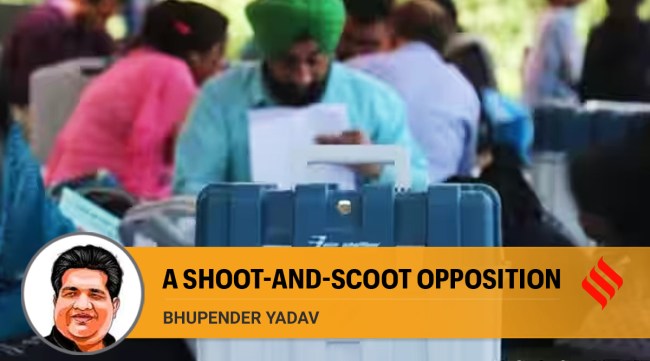Opinion Bhupender Yadav writes: We can’t have a shoot-and-scoot Opposition
Governments in healthy democracies must be held to account. But stalling Parliament, shifting goal posts and avoiding debate is not the way
 The Monsoon Session of Parliament which wrapped up recently is just one among the many examples when the Opposition tried to derail the democratic systems in place. (Representational Image)
The Monsoon Session of Parliament which wrapped up recently is just one among the many examples when the Opposition tried to derail the democratic systems in place. (Representational Image)
India is about nine months away from elections to the 18th Lok Sabha. Going to the people to seek their mandate every five years is an exercise that seeks to keep alive the democratic spirit of the country enshrined in the Constitution. It is a time for incumbent governments to present report cards and for Opposition parties to point out what they may deem to be lacunae in the government’s performance. Responsible Opposition parties are then supposed to lay out an alternative model of development before the people. This system helps a democracy thrive and people realise their aspirations.
A responsible Opposition is thus crucial for this system. Unfortunately, the people who failed to realise the people’s aspirations while they were in power for close to seven decades have ended up being a drag on the country’s development even in Opposition. The Monsoon Session of Parliament which wrapped up recently is just one among the many examples when the Opposition tried to derail the democratic systems in place.
The architect of the Indian Constitution, BR Ambedkar said, “The debates in Parliament are a vital part of the democratic process. They help to ensure that the laws are made in the best interests of the people.” Parliament is a place where dissent is welcome and wanted. However, the Congress-led opposition believes only in disruptions both inside and outside Parliament.
Parliament passed crucial pieces of legislation in the Monsoon Session, including the Digital Personal Data Protection Bill, 2023, The Forest (Conservation) Amendment Bill, 2023, the Biological Diversity (Amendment) Bill, 2023, the Registration of Birth and Death (Amendment) Bill, the Anusandhan National Research Foundation Bill, 2023, among several others. But the Opposition remained absent from all discussions barring the one on the Government of National Capital Territory of Delhi (Amendment) Bill, 2023. Had the future of their coalition not depended on participation in the NCT (Amendment) Bill, the Congress and its allies would have spent time giving sound bites to television channels outside Parliament instead of participating in the debate. Even in this debate, a member of the INDIA camp resorted to “gross violation of rules, misconduct, defiant attitude and contemptuous conduct”, a phenomenon unparalleled in the legislative history of India.
Unable to digest its loss in 2014, and a repeat drubbing in 2019 — thanks to mistaking electoral mandate to be its divine right — Congress has not participated in any parliamentary discussion constructively for the past nine years. By their own admission, the Opposition brought in the No-Confidence Motion without having any confidence in the motion. They argued that the intention was to hold the government to account. All governments in healthy democracies must be held to account. None less than Prime Minister Narendra Modi has welcomed questions on his government’s performance. So the argument for holding the government to account was noble. The same, however, wasn’t true for its intent. The Opposition chose to walk out of the discussion on the trust vote.
The Congress MP who moved the motion in Lok Sabha did not even exercise his right to reply after the PM had spoken. And that is because the Opposition never really had a case. They have only followed the policy of shoot-and-scoot over the last decade. Make an allegation, launch personal attacks on the PM, spread falsehood and then hide. This has become a policy that Congress and its allies have adopted.
Since 2014, in session after session, the Opposition has picked up one issue after another only to stall Parliament. This time they chose Manipur and kept shifting goalposts to avoid any meaningful debate on the matter. The Opposition began stalling proceedings on the ground that a discussion on Manipur be held under Rule 267 and not Rule 176. When Home Minister Amit Shah announced in Parliament that the government was ready for a discussion on Manipur with time being no constraint, the Congress shifted the goal post, knowing it had much to hide from its own misdeeds in not just Manipur but the entire Northeast, and demanded that the PM be present in the debate. Ironically, the Congress was not even present in Parliament when the discussion on Manipur was initiated. Sitting in television studios, they lied to the people that the government did not want to discuss Manipur.
India has seen unprecedented development under PM Modi in the last nine years. The Opposition knows it cannot fight with facts. So, it resorted to name-calling. But beyond sullying individual reputations, the use of indecent language in Parliament undermines the institution of Parliament — the highest people’s institution.
An Opposition devoid of imagination and constructive politics is detrimental to democracy. It believes in confusing voters and misleading the nation. A nation of 140-crore aspirations has no room for this negative politics. All politics, of the incumbents and those opposing the incumbents, must be pro-India. And on that count, the Congress has been as big a failure in Opposition as it was when in power.
The writer is Union Minister for Environment, Forest and Climate Change and Labour and Employment






